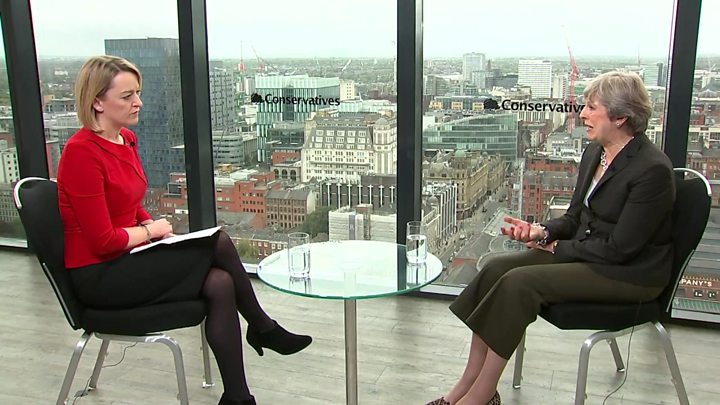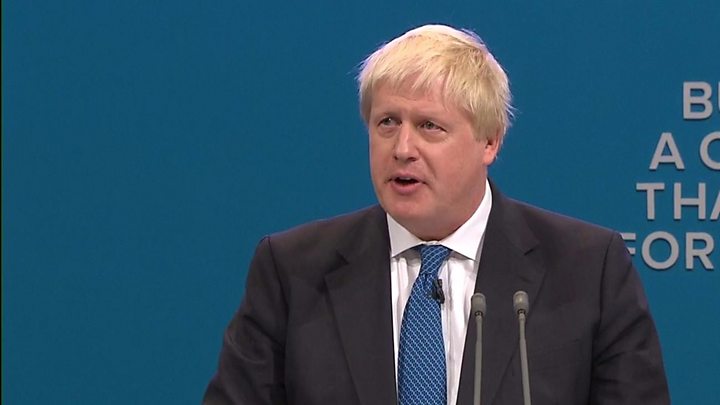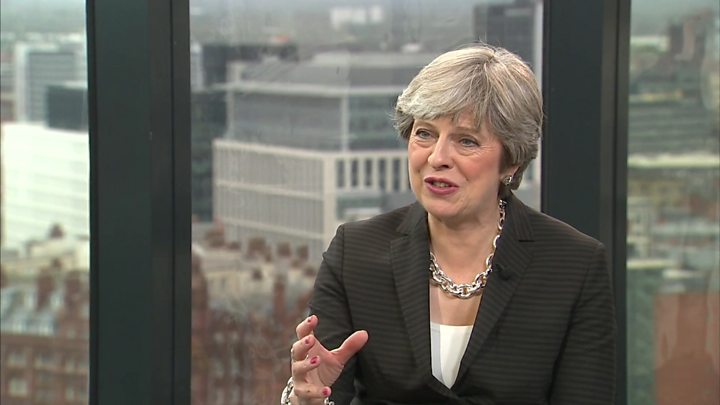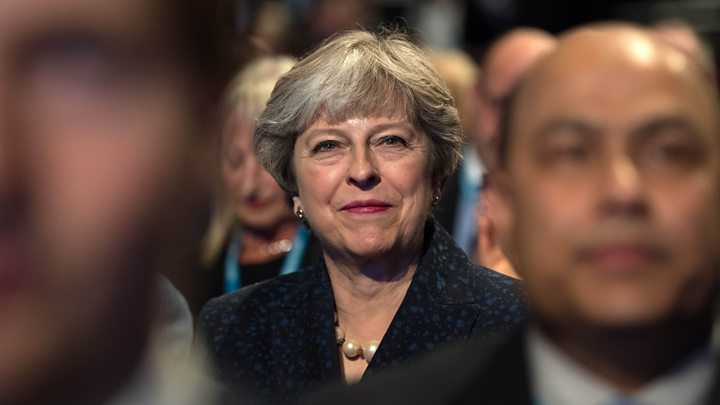
The prime minister said the foreign secretary's vision of Brexit reflected the government's approach.
"This isn't about an individual personality, it's about how we can deliver for people," she added.
Mr Johnson has delivered his party conference speech, saying it is time to "let the British lion roar".
But his recent comments on Brexit - including setting out "red lines" in a newspaper article - have triggered calls for him to be sacked.
Asked what it would take for him to be fired, Mrs May told BBC political editor Laura Kuenssberg that strong leadership involved "having a range of voices sitting around the table".
Responding to some Tory figures' concerns she was being undermined by the foreign secretary, she said: "It doesn't undermine what I'm doing at all."
She was speaking on day three of the Tory conference in Manchester, as:
- Mr Johnson also faced criticism for remarks about Libya at a fringe event
- Home Secretary Amber Rudd promised to ban the sale of acids to anyone under the age of 18
- Liam Fox and David Davis called for an end to pessimism over Brexit and for the British public to "keep their eyes on the prize" on offer
- Health Secretary Jeremy Hunt said 5,000 new places on nursing training courses would be created in England
- Ahead of its publication, Downing Street's audit of how people from different backgrounds are treated was said to contain "uncomfortable truths"
Mr Johnson set out his Brexit "red lines" at the weekend, triggering anger from some colleagues and accusations that he was targeting Mrs May's job.
But the PM played down any differences with the government's position.
"If you look at the issues Boris has been talking about they reflect the position we've taken in the Florence speech, setting out a vision of what this country can be doing in terms of its partnership with Europe in the future," she said.

Asked whether his interventions made her "cross", she replied: "Crucially, there's a lot of talk about Boris's job or this job or that job inside the cabinet.
"Actually what people are concerned about - they don't want us to be thinking about our jobs they want us to be thinking about their jobs and their futures.
"What government is for is about delivering for the public. That's where our focus must be."
In his much-anticipated speech in Manchester, Mr Johnson called for Brexit to be a moment of national renewal.
The foreign secretary told Tory activists the UK "can win the future" and should stop treating the referendum result as if it were "plague of boils".
He also praised Theresa May's "steadfast" leadership over Europe and insisted the whole cabinet was united behind her aim of getting a "great Brexit deal".
May's 'mission'

Mrs May has faced repeated questions about her leadership during the conference, having seen the Conservatives lose their Commons majority in June's general election.
She insisted she had the authority and ideas to improve the Tories' standing - and that her party was still setting the political agenda, adding that she had "listened" to voters' concerns on tuition fees and home ownership.
And she repeatedly stressed her "mission" in government, as set out when she took office, "to ensure that we no longer see people in this country that feel left behind".
Earlier during a round of media interviews the PM was asked by BBC Breakfast whether there were any "red lines" which Mr Johnson himself should not cross.

"I don't set red lines. Everybody uses this phrase 'red lines'. I don't set those sort of red lines," she told BBC Breakfast.
"All I would say is actually I think leadership is about ensuring you have a team of people who aren't yes men, but a team of people of different voices around the table, so you can discuss matters, come to an agreement and then put that government view forward, and that's exactly what we've done."
On BBC Radio 4's Today, Mrs May said the foreign secretary and the rest of the cabinet were united behind her Brexit strategy, insisting that European leaders knew what the UK wanted and that her Florence speech had "changed the dial".
"What I am very clear about is of course the prime minister is in charge," she said.
'Troublemaker'
She acknowledged that her message "did not come across in the general election" as she would have wanted and it was apparent the concerns of the British people were "more keenly felt" than people had thought.
Mrs May said the election had shown that many people felt "left behind and ignored" but she insisted that change would not happen overnight and no "great phrase" would transform things.
In the run-up to Mr Johnson's speech, pro-Remain Tory MP and former business minister Anna Soubry told Channel 4 News that she had asked the foreign secretary to resign over the weekend, describing him a "troublemaker".
Speaking ahead of his own conference speech, in which he called for greater optimism about Brexit, International Trade Secretary Liam Fox told BBC Radio 4's The World at One: "I think it's easier if we are all on a very strict script, it's very clear that the prime minister is in charge of this process."
Also on the third day of the Conservative conference in Manchester, Health Secretary Jeremy Hunt promised 5,000 new training places for nurses while International Development Secretary Priti Patel announced new conditions on foreign aid spending to prevent "fat cats" from monopolising contracts.
And a proposed ban on the sale of acids to under-18s was outlined by Home Secretary Amber Rudd.